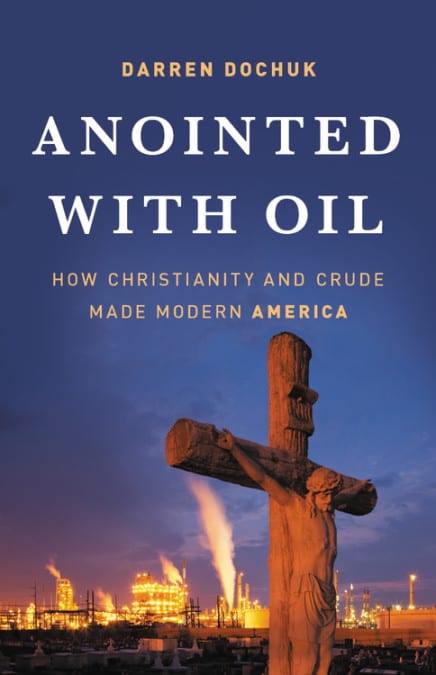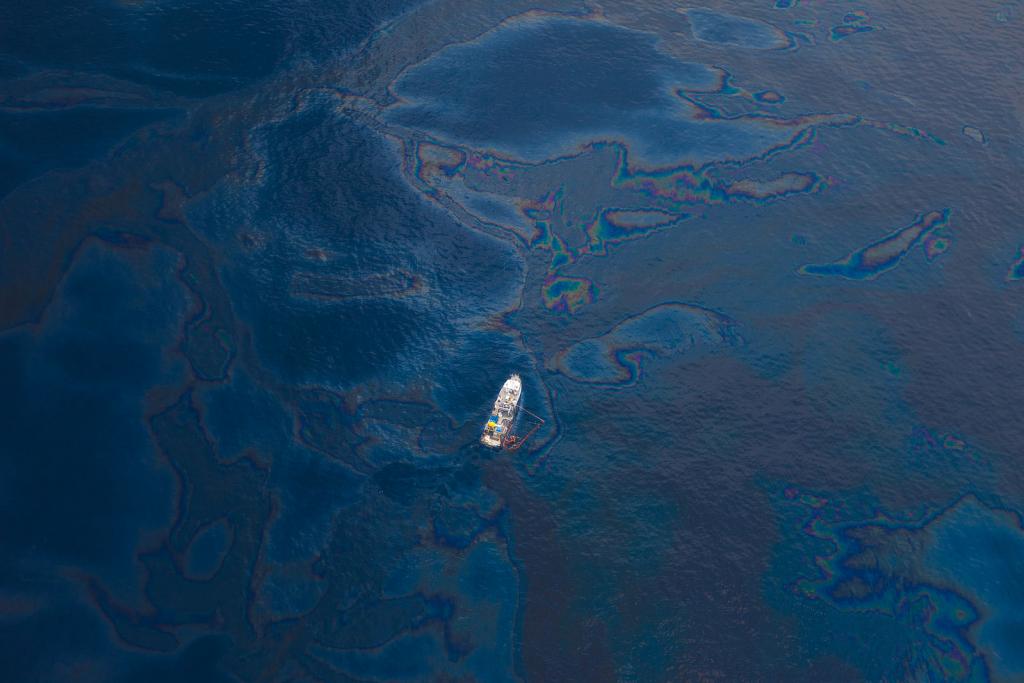Anointed with Oil: How Christianity and Crude Made Modern America, Darren Dochuk’s epic history about oil and religion, covers two family dynasties. The Rockefellers, which launched Standard Oil, represented the civil religion of crude and its attempts to rationalize both religion and the oil industry in the late nineteenth and twentieth centuries. The philanthropic activity funded by the bounties of oil, it was thought, could bring about the kingdom of God. Their religious institutions: the University of Chicago, the National Council of Churches, and the Interchurch World Movement.
 The Pews, by contrast, represented “wildcat Christianity.” Instead of building mega-companies, these independent oilmen drilled for oil on untapped land, praying for God’s favor and blessing on their fundamentalist and Pentecostal endeavors. God appeared to bless J. Howard Pew’s Sun Oil, and this dynasty also sought oil’s profits to build God’s kingdom. Their religious institutions: Fuller Theological Seminary, the National Association of Evangelicals, and Christianity Today.
The Pews, by contrast, represented “wildcat Christianity.” Instead of building mega-companies, these independent oilmen drilled for oil on untapped land, praying for God’s favor and blessing on their fundamentalist and Pentecostal endeavors. God appeared to bless J. Howard Pew’s Sun Oil, and this dynasty also sought oil’s profits to build God’s kingdom. Their religious institutions: Fuller Theological Seminary, the National Association of Evangelicals, and Christianity Today.
These two “sparring spirits of capitalism” thus subsidized America’s most vibrant forms of twentieth-century Protestantism. Though they might spar with each other, the Pews and Rockefellers alike understood oil as a liquid blessing of God and marker of “celestial hope” for America, the world, and God’s kingdom.
Narrating this story is a remarkable achievement in itself. But what I found most fascinating about Dochuk’s masterful book was the rest of the story. What happened to the children and grandchildren and great-grandchildren of these oil titans? It turns out that the third and fourth generations have largely repudiated what their ancestors built.
Why? The specter of environmental disaster. Dochuk writes, “From the late 1960s to the mid-1970s, it seemed like news of water set ablaze by oil and creatures suffocated in ebony goop would not abate.” The Cuyahoga River caught on fire in Cleveland. Rachel Carson, the daughter of devout Presbyterians, excoriated the chemical industry for its deadly synthetic pesticides in her classic jeremiad Silent Spring. The tragedies, financial and environmental alike, would continue in the late twentieth century and into the twenty-first century. On March 24, 1989, the supertanker Exxon Valdez bottomed and spilled eleven million gallons of oil, and in 2001 Enron declared bankruptcy after it was discovered that executives had doctored the books and seized a moment of government deregulation to carry out a bonanza of speculation.
It wasn’t just environmentalists that were concerned. President Richard Nixon, presiding over the first Earth Day in 1970, acknowledged the crisis. Even the conservative National Review weighed in. The “violation of the land, the violation of the natural environment generally, is felt without even the possibility of argument to be the quintessence of evil,” one of its columnists wrote, and conservation is “likely to be a powerful, indeed an overriding spiritual issue, which it would be political suicide to concede to the Left.”
The newly formed Environmental Protection Agency lauded evangelical Francis Schaeffer’s Pollution and the Death of Man, which prompted a friendly statement from the National Association of Evangelicals. President Jimmy Carter offered his assessment of an American malaise, saying that humans had “despoiled God’s earth.”
Not everyone agreed with these critiques. There were still lots of people who believed in big oil. One advocate said it is the “single most vital industry in the world. . . . It is the juice of the fountain of eternal youth. It is health. It is comfort. It is success.” A surging conservative movement and the religious right tapped into population weary of national self-critique. Ronald Reagan spent the 1980 election cycle traveling the country, preaching energy abundance and American greatness. He chose former Texas oilman George H.W. Bush as his running mate.
But the Rockefellers and Pews agreed with Carter more than with Regan. As Dochuk explains, “Some of the very architects of international oil now deemed the commodity, rather than a liquid of the gods, the devil’s waste, responsible for the subjugation of entire peoples, the perpetuation of unequal systems of power, and a crumbling world order.”

John Rockefeller had been paying attention to young people in the 1960s, including the Black Panthers, SDS members, and Ivy League students. He tried to understand their critiques of big business pollution, and colonialism. He read Rachel Carson. So too did many of his nieces and nephews, who comprised the fourth generation of Rockefellers raised as environmental and energy crises grew the public’s imagination.
Take, for example, the case of Marion Rockefeller. She was a back-to-nature fan of Henry David Thoreau who spent weekends in an old caboose in the California hills. She recounted a dream in which her extended family was “gliding” down a road “in very expensive clothes” with beauty all around. But the peace was broken by the sight of people “in the pastures on both sides” peering at the Rockefellers “with envy and curiosity.” Continuing to describe her dream, she said, “I feel embarrassed and want to tell them something. . . . Somehow I manage to get away from my family. Then, the next thing I know, I’m in the field with the regular people, watching the Rockefellers on parade. I feel glad that I’m not one of them.” As one commentator said about the Rockefeller cousins in the 1970s, “Most want to experience the Horatio Alger myth in reverse. To some degree they are all princes and princesses yearning to be paupers.”
Steven Rockefeller, the son of liberal Republican Nelson Rockefeller, embodied similar sensibilities. He went to Union Theological Seminary, joined the faculty at Middlebury College, and became an environmental activist. In 1990 he organized a four-day symposium on religion and the environment called “Spirit and Nature: Religion, Ethics, and Environmental Crisis.” During the conference he paid tribute to Rachel Carson and Bill McKibben. Rockefeller also joined the board of the Rockefeller Brothers Fund. As Dochuk writes, “Much like his great grandfather, Steven Rockefeller wore his theology openly and leaned on it as a guide to life. Yet the theology itself could hardly be more different. The civilization the younger Rockefeller dreamed of was drained of his ancestor’s petrocapitalist impudence and Baptist assurance that the future was America’s to guide, exploit, and control. Steven Rockefeller’s theology preferred that Americans fall in line, bond with the world as one, and approach a new millennium eager to commune with nature rather than capture it.”
The Pews joined in. The Pew Foundation moved away from the conservative causes that defined its early years. They began to champion energy conservation and the environment.
On April 22, 1990, the two former competitors—one named Pew, the other Rockefeller—joined together. Two hundred million people around the world marched in the twentieth annual Earth Day, and the Pew Charitable Trusts and the Rockefeller Foundation helped bankroll the activism. Going forward, many Pews and Rockefellers would oppose the Keystone Pipeline and criticize ExxonMobil for inaction on climate change. Al Gore, who would star in the 2006 documentary An Inconvenient Truth, had his education funded by a Rockefeller Foundation scholarship at Vanderbilt University Divinity School.
In a conclusion that J. Howard Pew and John D. Rockefeller could not have imagined in their worst nightmares, their descendants were trying to roll back the power and profits of their oil empires. But unless the “green lobby,” dependent, ironically, on oil money, can reverse the catastrophes of unbridled corporate oil and unrestrained industrialization, the real nightmare may be still ahead.













